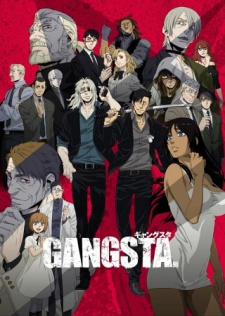
Gangsta is set in a city slum, complete with all the gangs, prostitutes, broken apartment complexes, and filthy narrow streets that are an inevitable part of the “city slum” package. It is a tiny and less-vibrant Chicago, but with slightly less true human suffering and more caricatures of what an inter-city sob story is supposed to look like. Three bosses run the area in relative harmony with one another, each complete with multiple relevant personas locked together in romances, familial relations, violent histories…you name it, some pair of characters share it. Oh, and there are biologically fueled superhumans called Twilights, who take mysterious medicines in order to run, jump, and slash harder than any normal human ever could. Except for the normal humans that do. If this already seems clausterphobic, let me begin by saying that despite setting the right tone through its high-contrast dark visuals and incongruent jazz soundtrack, when it comes to substance Gangsta poses a thousand meaningless questions and barely answers a single one before begging for another season.
The show is themed like a buddy cop movie if the two cops were actually friends, and if they were hired killers instead of actual cops. Roger Ebert called it the “wunza”; of our two protagonists, wunza smooth-talking ladies’ man with a perfect memory and a dark history, wunza deaf Twilight with a samurai sword with a penchant for overdosing and flying off the handle. They take odd jobs from around the city, having close connections to all the various families, mobs, and institutions in power. Early on they rescue a prostitute named Alex, who actually has very little impact on the story but does make them look more humane than we glean from their wanton killing sprees and backdoor dealings with the police and the mob.
For a while we watch as the three (read, two) of them go around the city, cuing us into how well-known and respectable they are, as well as the mechanics of the Twilights and how the three bosses maintain a delicate balance in order for them to survive. More violence and flashbacks about violence are designed to make us dislike these monsters, except that we are also supposed to feel sympathetic towards their plight because they get mistreated for being killing machines, and because we see innocent women and children among their ranks. Ditto the protagonists, the gangs, the ordinary citizens, and everyone else. Moral quandary, according to Gangsta, is having two disconnected extremes represented by the same group, and not being able to decide how to feel about them as a whole.
Eventually the plot shows its face in relation to this very question. A group of normal humans who happen to be stronger and faster and in all ways better than the Twilights incites a wave of anti-Twilight sentiment by going around and killing every single one they can find in a backwards effort to remind the public of how brutal their targets are. New allegiances and characters crawl out of the woodwork to stake their claim in the pie before the Twilights all die, the protagonists win, or the show comes to a close, the latter being easily the most likely as the gears of the plot only start turning in earnest well after the halfway point. In the meantime we get a series of reminders that this is indeed a city slum, more hardboiled and rough than anything we may have seen in the more harmonious and joyful universes of Black Lagoon, Baccano, and Texhnolyze. Gangsta would exist as an ode to its own gritty darkness were it not for blatant sentimentality and forthrightness, let alone the bizarre and intrusive existence of the superhuman Twilights and their pseudoscientific lore.